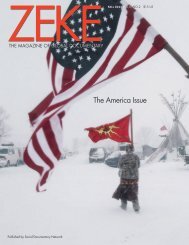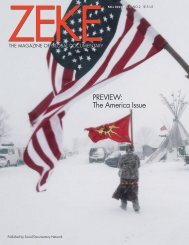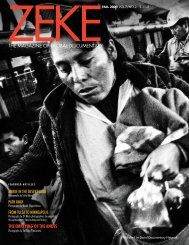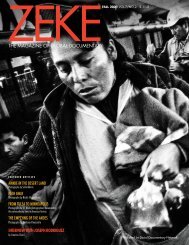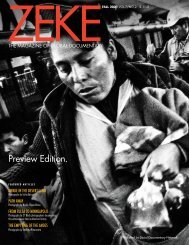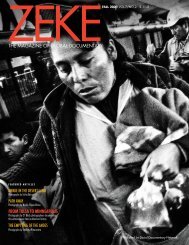ZEKE Fall 2019
Contents includes: "Youth of Belfast" by Toby Binder, and "Delta Hill Riders" by Rory Doyle, winners of ZEKE Award for Documentary Photography "Rising Tides" with photographs by Sean Gallagher, Lauren Owens Lambert, and Michael O. Snyder "Out of the Shadows: Shamed Teen Mothers of Rwanda" by Carol Allen Storey Interview with Lekgetho Makola, Head of Market Photo Workshop, South Africa, by Caterina Clerici "Why Good Pictures of Bad Things Matter" by Glenn Ruga Book Reviews and more...
Contents includes:
"Youth of Belfast" by Toby Binder, and "Delta Hill Riders" by Rory Doyle, winners of ZEKE Award for Documentary Photography
"Rising Tides" with photographs by Sean Gallagher, Lauren Owens Lambert, and Michael O. Snyder
"Out of the Shadows: Shamed Teen Mothers of Rwanda" by Carol Allen Storey
Interview with Lekgetho Makola, Head of Market Photo Workshop, South Africa, by Caterina Clerici
"Why Good Pictures of Bad Things Matter" by Glenn Ruga
Book Reviews and more...
- No tags were found...
Create successful ePaper yourself
Turn your PDF publications into a flip-book with our unique Google optimized e-Paper software.
Youth of Bel<br />
Struggling<br />
with a Legacy<br />
of Conflict and<br />
the Looming<br />
Brexit Crisis<br />
by Alessandra<br />
Bergamin<br />
Photos by Toby Binder<br />
Last April marked more<br />
than twenty years since<br />
the end of Northern<br />
Ireland’s sectarian conflict<br />
known as “the Troubles.” The<br />
more than 30-year war pitted<br />
Irish Catholic nationalists,<br />
who favored unification with<br />
the Republic of Ireland to the<br />
south, against Protestant loyalists<br />
who supported continued<br />
British rule. While memories<br />
of bombings and bloodshed<br />
linger and signs of segregation<br />
still divide the capital city of<br />
Belfast, the country’s youth are<br />
torn between a palpable past<br />
and an uncertain future.<br />
The roots of the Troubles<br />
stretch back to the creation<br />
of Northern Ireland itself. The<br />
Unionist political establishment,<br />
which was largely Protestant,<br />
maintained power over the<br />
Irish Catholic minority through<br />
discriminatory policies. In<br />
the 1960s, inspired by the<br />
American civil rights movement,<br />
the country’s Irish Catholic<br />
community formed a civil<br />
rights association to protest the<br />
systemic discrimination. But the<br />
organization’s peaceful protests<br />
were often met with excessive<br />
force, only heightening tensions<br />
between the police, politicians,<br />
and the movement. As the<br />
situation escalated, the British<br />
Army was deployed to Northern<br />
Ireland, and soon Unionist<br />
and Republican paramilitaries<br />
— such as the Irish Republican<br />
Army (IRA) and the Ulster<br />
Defense Association — formed.<br />
As riots and bombings became<br />
commonplace, brick and steel<br />
“peace walls” were erected to<br />
separate sectarian communities.<br />
The Troubles reached a new,<br />
violent height in 1972 when<br />
British paratroopers opened<br />
fire on Catholic demonstrators<br />
in Derry, killing 13 people and<br />
injuring 14 more. In 2010, an<br />
official inquiry determined that<br />
the attack, which came to be<br />
known as ‘Bloody Sunday,’ was<br />
unjustified.<br />
An actual possibility for<br />
peace wouldn’t arrive until the<br />
late 1990s when the British<br />
and Irish governments and<br />
paramilitary groups met to<br />
discuss a peace treaty. The<br />
talks led to the landmark Good<br />
Friday Agreement in December<br />
12 / <strong>ZEKE</strong> APRIL FALL <strong>2019</strong> 2015









